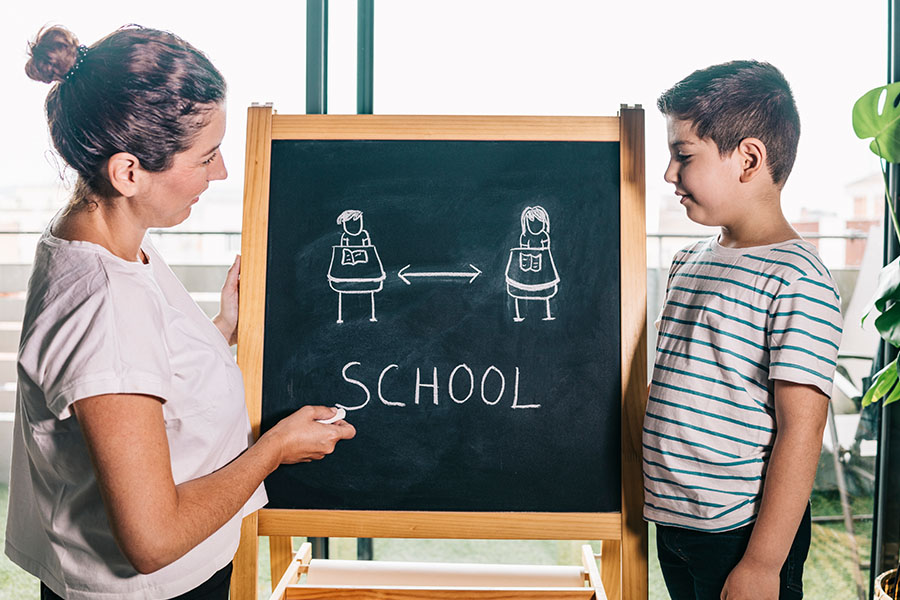“Education is not preparation for life; education is life itself.” – John Dewey.
It is rightly said that education shapes a child’s future. However, with too many educational board options, parents often get confused.
If you are also a parent who wants to make an informed decision for your child’s future, you have reached the right place.
In this guide, we will give you some detailed information about the Central Board of Secondary Education (CBSE) and compare it to other types of educational boards in India, such as the Rajasthan Board of Secondary Education (RBSE).
This guide will also help you understand how choosing the perfectly suited board is important for your child’s growth.
However, before diving deep into the details about different types of educational boards, you have to understand the importance of this decision.
Why should you choose the right educational board for your child?
Which educational board a school follows should be the first and foremost aspect parents must consider before admissions. Each educational board has different benefits and plays a crucial part in their child’s learning experience.
It creates the foundation of your child’s journey ahead, personality development and ensures what kind of future opportunities they will receive.
The right educational board must also be chosen, keeping in mind your child’s ambitions.
So, how do you decide the right educational board? Here is your complete guide.
Types of Educational Boards in India
Indian schools have a variety of education boards to offer to their students. These boards are divided into four categories. They are:
- Central Boards:
CBSE (Central Board of Secondary Education): This is the most common and widely recognised education board in India, accepted by schools. This national-level curriculum operates under the Ministry of Education, Government of India. CBSE is designed for students across the country and covers a wide variety of subjects.
- State Boards:
Keeping in mind India’s diversity, each state in the country has its own educational board. For example:
- RBSE (Rajasthan Board of Secondary Education): As the name suggests, the RBSE curriculum is followed only in schools of Rajasthan.
- MPBSE (Madhya Pradesh Board of Secondary Education)
- MSBSHSE (Maharashtra State Board of Secondary and Higher Secondary Education)
- TN Board (Tamil Nadu State Board)
- International Boards:
Besides central and state boards, several Indian schools also follow international curricula. They are:
- IB (International Baccalaureate)
- CAIE (Cambridge Assessment International Education)
- ICSE (Indian Certificate of Secondary Education)
ICSE, another common curriculum designed to cater to all students of India, is known for its detailed syllabus. The curriculum is conducted by the Council for the Indian School Certificate Examinations (CISCE), and it places more emphasis on language and arts.
Overview and benefits of CBSE board
You must have already heard a lot about CBSE. However, before choosing this curriculum, you need to have an in-depth understanding of it along with its benefits.
CBSE curriculum is one of the most trusted boards in India. It covers all subjects along with many extra-curricular activities for students, targeting their overall development.
The curriculum follows the National Council of Educational Research and Training (NCERT) framework, which aims at a balanced academic approach.
Let us learn the benefits of CBSE:
- National recognition that makes students’ transfer easier
- Ensures a uniform curriculum to maintain consistency in education across all regions of the country
- It further helps students who are willing to appear in competitive exams
- Ensures holistic development of students
- Offers skill-based education for easy learning
- The entire curriculum has a student-friendly approach
- It has also been globally recognised and accepted by various schools in the UAE, Nepal and Singapore.
CBSE vs RBSE
If you are a resident of Rajasthan and cannot decide whether to opt for the CBSE or RBSE curriculum for your child, then this list will help you. Let us recognise the difference between these distinct types of educational boards in India:
- Curriculum:
While CBSE follows the NCERT-based curriculum, RBSE has a state-specific syllabus which also covers Rajasthan’s regional history.
- Exam:
CBSE has a concept-based and analytical examination pattern, whereas RBSE emphasises descriptive and factual learning.
- Language:
Language has a huge impact on different curricula. While CBSE board’s instructions are in English and Hindi, RBSE majorly focuses on Hindi.
- Competition level:
Competitiveness is more on a national level in CBSE and at the state level in RBSE.
- Student transfer:
A student can easily transfer from one school to another if they both follow the CBSE curriculum. However, when it comes to RBSE, it is a hassle to transfer to a school in another state.
- Help in competitive exams:
CBSE is aligned with Indian competitive exams, such as NEET, NDA, JEE, and more, while RBSE board students require additional preparation. However, RBSE comes in handy when students appear in state-level exams.
Verdict for CBSE vs RBSE
It may still be a bit confusing for parents to decide whether to opt for the CBSE curriculum or RBSE. However, an easier way to decide is to see the bigger picture.
If your child’s ambition is to appear in exams at the national or international level, then the CBSE board is the right choice for them. On the other hand, for families rooted in Rajasthan, seeking regional-level education, RBSE will provide them with a strong foundation.
For students based in Jaipur, The Shri Ram Universal School is among the best institutions that function according to the CBSE curriculum. TSUS focuses on their students’ overall growth and emphasises not only academics but also a good command of extra-curricular activities as well.
Why TSUS could be the best choice for your child?
Affiliated with CBSE curriculum, TSUS provides its students with a nurturing platform where they can discover their talents and abilities. It emphasises on a student’s overall development to educate them to make the right choices.
TSUS believes every child is unique and thus creates a joyful space for them to become wise, compassionate and responsible human beings.
FAQs
- What are the main types of educational boards in India?
Ans. There are four types of educational boards in India:
- CBSE
- State Boards
- International Boards
- ICSE
- Which board is beneficial for a student who wishes to appear in competitive exams like JEE and NEET?
Ans. CBSE is the better choice for students preparing for competitive exams.
- Which Indian educational board has more global recognition?
Ans. CBSE, compared to all other types of educational boards in India, has a higher global recognition.
- Is CBSE more difficult than RBSE?
Ans. Not necessarily. CBSE and RBSE both follow different understanding concepts. CBSE has a concept-based and analytical examination pattern, whereas RBSE emphasises descriptive and factual learning.
Note for parents:
It is important for you to consider your child’s interests, learning style and goals before you make the final decision. Ensure to also promote curiosity in your child regarding education, along with bringing out the best in them.



